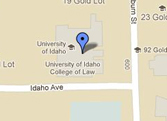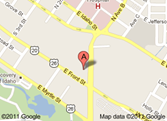College of Law
Moscow

uilaw@uidaho.edu
Administration Office: 208-885-2255
Dean’s Office: 208-885-4977
fax: 208-885-5709
Menard 101
711 S. Rayburn Drive
Mailing Address:
College of Law
University of Idaho
875 Perimeter Drive MS 2321
Moscow, ID 83844-2321
Boise
First Monday - February 6, 2012
In this issue:
- College Celebrates Role of Distinguished Alumnus in Landmark Case for Equal Rights
- State Bar Leaders Note College’s Achievements, Look to the Future, in Report of Annual Visit
- Tribal Courts to be Focus of 2012 Native American Law Conference in Moscow
College Celebrates Role of Distinguished Alumnus in Landmark Case for Equal Rights
Great cases often arise in modest circumstances. They arise whenever the facts of injustice intersect with the law of equal justice. In 1968, the Boise law office of Allen Derr (UI Law ’59) could be found at that intersection. Sally Reed walked through the office door and told a simple story that launched an odyssey to the United States Supreme Court.
The story began with a family tragedy. Sally’s son had taken his own life; he died without a will. When Sally applied to be appointed administrator of the estate, her application was opposed by her estranged husband who sought to be appointed instead. The Probate Court ruled for the husband, relying upon an Idaho statute dating back to territorial days. The statute provided that if two equally qualified individuals, one male and one female, sought appointment to administer an estate, the male must be preferred. The statute had been an accepted part of Idaho law for more than a century when Sally’s case arose; indeed, she reportedly sought help from sixteen lawyers before finding one – Allen Derr – who would take a case in the public interest with little regard for his own compensation. Derr appealed the probate ruling to the District Court, arguing that the Idaho statute violated the equal protection clause of the Fourteenth Amendment to the United States Constitution. The District Court agreed; but when Sally’s husband appealed, a divided Idaho Supreme Court upheld the constitutionality of the statute.
With consultative help from a bright young professor at Rutgers University named Ruth Bader Ginsburg, Derr successfully petitioned the United States Supreme Court for certiorari. Professor Ginsburg and others participated on the brief, but it was Derr who argued the case. On November 22, 1971, a unanimous Supreme Court decided in favor of Sally Reed, holding for the first time, as Derr had contended, that the Fourteenth Amendment was applicable to gender discrimination. The Court held that the Idaho statute could not satisfy even a “rational basis” test, and suggested that a standard of heightened scrutiny might be employed in future cases. “To give a mandatory preference to members of either sex over members of the other,” the Court said, “... is to make the very kind of arbitrary choice forbidden by the Equal Protection Clause of the Fourteenth Amendment.”

Sensing that Idaho, too, should celebrate one of its own, the College of Law on November 30, 2011, hosted a reception for Derr and his spouse Judy Peavey-Derr, at the Idaho Water Center in Boise, home of the College’s third-year program and of the newly relocated Idaho State Law Library. The event featured remarks by Martin (“Marty”) Peterson, Special Assistant for State Governmental Affairs to the President of the University of Idaho, who sketched the historical importance of the Reed case and of Derr’s remarkable career in public interest and First Amendment law. Dean Don Burnett noted that Derr, a member of the University’s Alumni Hall of Fame, had demonstrated an unselfish commitment to pro bono service, and that Derr had been an early supporter of, and role model for, the College’s mandatory pro bono program, Among the nearly 100 persons attending the reception were Peterson’s incoming successor at the University of Idaho, former state senator Joe Stegner; Idaho Chief Justice Roger Burdick (UI Law ’74); Idaho Court of Appeals Judge Karen Lansing; United States Senior Judge Stephen Trott of the Ninth Circuit; United States Magistrate Candy Dale (UI Law ’82); state senate majority leader Bart Davis (UI Law ’81); retired Idaho Supreme Justice and former Derr law partner Jesse Walters (UI Law ’63); Idaho State Bar Commissioner Mary “Molly” O’Leary (UI Law ’94) and Bar Executive Director Diane Minnich; members of the University of Idaho law faculty and staff in Boise; and numerous friends along with members of the Derr and Peavey families from locations as far away as Alaska.
Further information about the event is available from Terri Muse (tmuse@uidaho.edu), director of development at the College of Law.
State Bar Leaders Note College’s Achievements, Look to the Future, in Report of Annual Visit

In a letter dated December 13, 2011, President Larsen summarized the visit, saying that it “reconfirm[ed] the value of the cooperation and dialogue between the bar and the UI College of Law.” The letter made important observations including the following:
- The Idaho Law Learning Center concept for Boise will provide “opportunities to create programs to enhance and educate legal professionals and the public. Given the Law Center’s proximity to the Law Learning Center, we hope to be included in the planning discussions for the Center.”
- “We congratulate [the College] on the pass rate [90% of first-time takers] on the recent [July, 2011] bar examination. Congratulations are also in order for the National Jurist’s ranking of the UI College of Law as one of the top 20 law schools for clinical opportunities.”
- “The changes in the curriculum outlined in the meeting with the faculty represent to us the law school’s commitment to provide an education that will help prepare students for the changing practice of law.”
- “[T]he meeting with President Nellis and Provost Baker highlighted the University’s commitment to the College of Law. The resolve of the administration in establishing a third year law program and the continued commitment to establishing a full three year law school at the Law Learning Center, speaks for the value the University places on the College of Law.”
- “The many accomplishments of the University of Idaho College of Law and its students enhance the state bar and legal profession in Idaho.”
The College of Law welcomes the “Idaho collegiality” and support fostered by these annual leadership visits, which have produced closer relations between the legal profession and the legal academy than can be found in most states. Further information is available from Dean Don Burnett.
Tribal Courts to be Focus of 2012 Native American Law Conference in Moscow
The annual Native American Law Conference, hosted by the University of Idaho College of Law, will focus this year on “Tribal Courts: Jurisdiction and Best Practices.” The conference, to be held on March 23 in the College of Law courtroom, will feature United States Attorney Wendy Olson, Deputy United States Attorney & Tribal Liaison Traci Whelan, Christine Folsom-Smith, Director of the National Tribal Judicial College, and Nez Perce Tribal Attorney Julie Kane (UI Law ‘’89), along with judges from tribal courts around the Northwest. The topics will include implementation of the Tribal Law & Order Act of 2010, tribal court funding strategies, the importance of tribal appellate courts, full faith & credit for tribal court orders, ethics in the courtroom, and jury trials in tribal courtrooms. A full list of speakers and topics, plus registration information, can be found on the College of law website at Native American Law Conference.

Further information about the Native American Law Conference, or about the study of Native American Law at the University of Idaho, is available from Professor EagleWoman.


